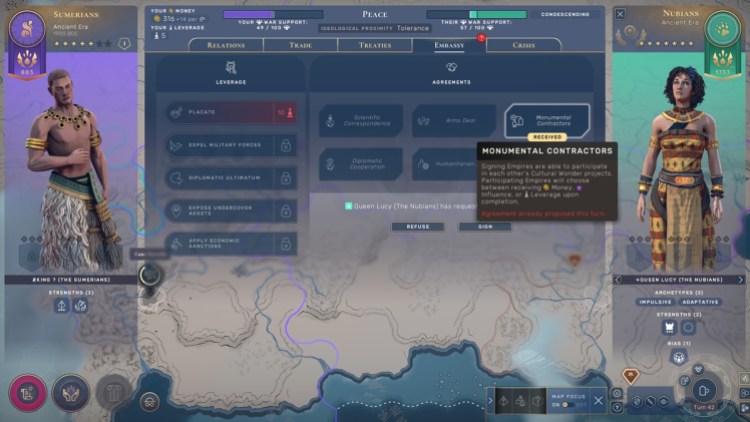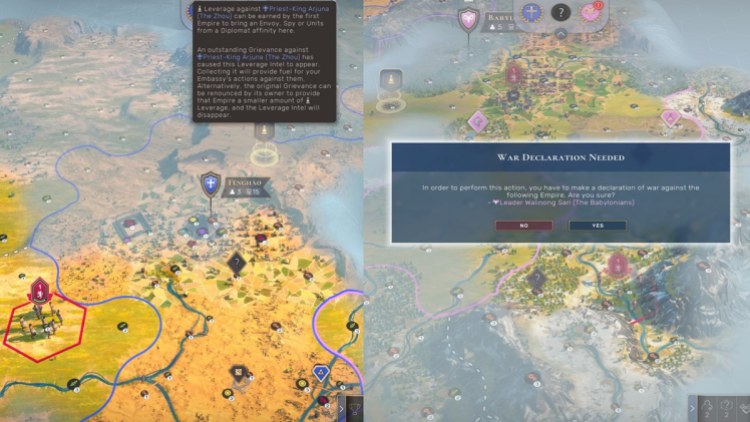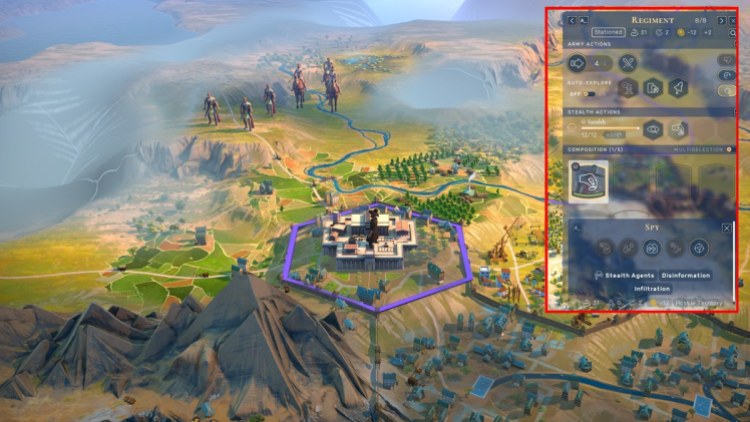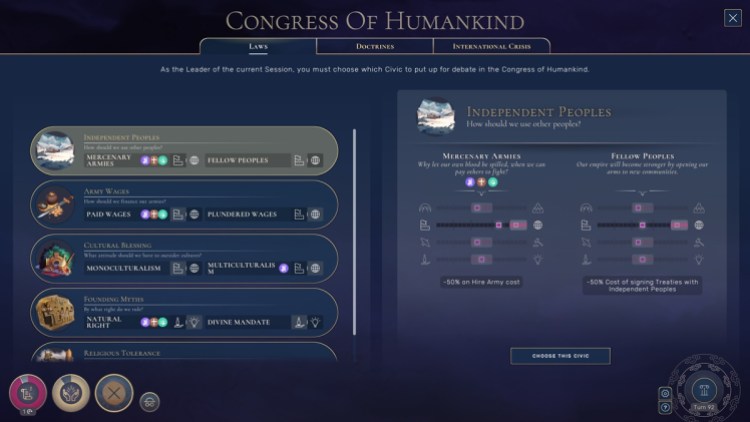Humankind: Together We Rule is the first major expansion for Amplitude Studios’ 4X strategy game, it’s designed to give you a lot of options when it comes to diplomacy and espionage.
This was something I looked forward to, considering the issues I’ve had with some of Humankind‘s core components when I initially reviewed it last year. While it does add new features to keep things refreshing, a few concerns still remain.
Gaining a Leverage
Starting your run in Humankind: Together We Rule is just like the base game. You’re still going to rush for the necessary Era Stars if you want the ideal culture pick from the beginning. Things change, ever so slightly, once you encounter your first civilization. You’re told that you can build an Embassy, and doing so unlocks new Embassy actions. These include agreements where both empires are able to recruit each other’s Emblematic Units, participation in building Wonders, research cost reduction, and more.
On the same panel, you’ll see more actions that cost Leverage. These are generated by grievances or mishaps between two empires. Similar to curiosities, you can collect these little pawn icons on the map using your agents (more on these units later). You may decide to expel an army from your territories, reveal undercover assets, and placate your rival to lower their war support. In essence, you’ll have more tools at your disposal if you want to manipulate your opponent’s moves.
Cultures with a focus on diplomacy
Humankind: Together We Rule adds six cultures with a focus on Diplomatic Affinity. The cultures include the Sumerians (Ancient Era), Han Chinese (Classical Era), Bulgarians (Medieval Era), Swiss (Early Modern Era), Scots (Industrial Era), and Singaporeans (Contemporary Era). And they all have their own unique traits, districts, and units. I found that the Sumerians are quite powerful in their own right thanks to the science bonuses from their Eduba. Meanwhile, the Bulgarian trait, Victors’ Honor, meant extra Leverage gains if you win battles without losing single unit.
What’s common among all of them is that all their units, not just agents, are able to collect Leverage on the map. Additionally, they’ve all got the Diplomatic Affinity action — Demilitarization — which lets you select any territory and turn it into a demilitarized zone (DMZ). Trespassing military units will lose HP, and they’ll also provide you with Leverage, while they’re within those lands. This sounds good for both offense and defense, at least on paper. Sadly, this is where problems start to arise.
Collection woes
The first issue is that Demilitarization isn’t beneficial in the long run. While you might gain a smattering of Leverage, your NPC opponent is more likely to just run off to an adjacent territory, nullifying the action in the first place. It might be more viable if your city is being besieged, but, by then, you’ll know you’re on the losing end.
The second is the collection of Leverage. As mentioned earlier, these can appear on the map (i.e., a pawn icon). The downside is that it’s entirely dependent on what your opponent does throughout the game. If your opponent isn’t making too many mistakes (i.e., forward-settling or trespassing), then you won’t find a lot of stuff to gather.
Worse, it’s entirely possible for Leverage to spawn within the borders of hostile empires (i.e., go to war -> win a war -> border friction/extra units might cause Leverage to pop). However, since they’re inside owned territories, you can’t pick them up with your military units. That means you’ll have to rely solely on agents that are roaming around, which is the enforced limitation on non-Diplo cultures. Because of these, I realized that it was better to progress by waging war, as opposed to the tiresome method of acquiring Leverage points.
Envoys and espionage
Speaking of agents, Humankind: Together We Rule adds several, such as the Envoy, Spy, and Spymaster, as well as the Prowler military unit. The Envoy is your diplomat, visiting empires to provide a slight increase to influence gains or the lands of free peoples to boost patronage. The problem: the Envoy is completely visible on the map. As such, if you have unruly barbarians that spot it, you can bet that you’d need to retreat every single time.
The Spy and Spymaster, meanwhile, are stealthed agents with their own meter. They can move around without being spotted, though there’s a chance they’d get revealed, too. Spies can watch over a city so you always know what’s going on, and you can siphon resources from nodes. As for the Spymaster, it’s just an upgraded version, with the ability to sabotage as well. Lastly, the Prowlers are the old Saboteurs, except they’ve got the new stealth meter.
All in all, I did enjoy the inclusion of agents in the game. It was also fun to have spies and spymasters hidden in cities, only to use them as reinforcements to backstab defenders. Perhaps my only gripe is tied to what I’ve experienced since release, that of enemies retreating from lopsided battles. For instance, if you really need to get rid of certain enemy envoys in your domain, there’s a high chance they’re run away once you engage them. You won’t even have the movement points left to chase them down.
The Congress of Humankind
Lastly, the Congress of Humankind is akin to the United Nations/World Congress in Civilization or the Galactic Senate in Stellaris. Each member empire is able to vote on resolutions/laws, choose doctrines, or partake in an international crisis. The last one is fairly important, as it can lead to mishaps if you click on the wrong buttons. For example, if you’ve defeated a rival in a war, several grievances might pop up. If you enforce these demands, put them up for a vote, and subsequently lose that vote, then you’d be embroiled in a war again.
I should also mention a notable bug. I’ve seen a tooltip error when interacting with free peoples, which also prevented me from increasing patronage. Reloading my save didn’t work, but it seemed to have gotten fixed after that minor civ transitioned into a different one. There were also moments when I couldn’t upgrade my units despite being in allied territories.
In the end, I do think that Humankind: Together We Rule has the right tools to entertain you for a few hours. You can try the diplo game and the new civs to see what suits you. Still, if you’ve had problems with the core mechanics and components of the game (i.e., Neolithic rush, a select few civs being more ideal than others, Whac-A-Mole with opposing armies/agents, lacking in war support, and more), then this might not change your mind.












Published: Nov 9, 2022 11:30 am